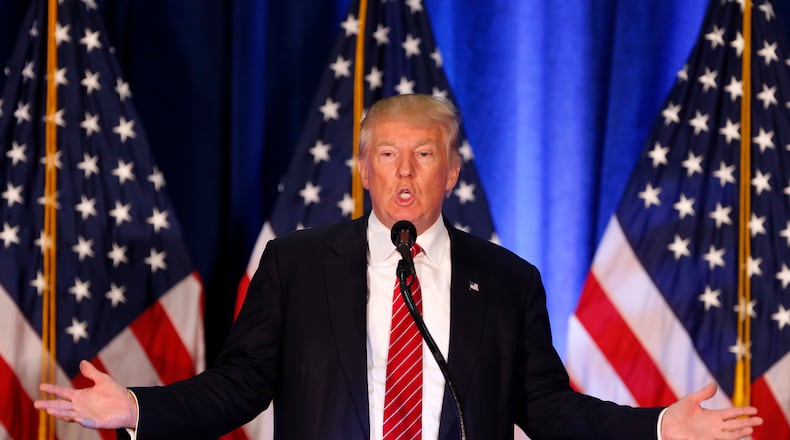GOP presidential nominee Donald Trump called for "extreme" vetting of immigrants who want to come to America in a policy speech Monday in Ohio.
Trump challenged Hillary Clinton’s fitness to serve as president and vowed to block anyone who sympathizes with radical extremists.
Here’s what they are saying about Trump’s speech.
Looking to reclaim the offensive
“Donald Trump on Monday upped his call for action against radical Islam in an effort to reclaim the offensive on national security, proposing an ideological test to keep would-be immigrants with radical views out of the US. The proposal was one of several Trump outlined in an Ohio speech laying out his vision for fighting Islamic extremism. In doing so, he sought to turn the tables on critics who are depicting him as unfit to serve as commander in chief and accused Democratic presidential nominee Hillary Clinton of lacking the "mental and physical stamina" to fight ISIS.”
Trump evokes cold war in speech
“Donald J. Trump on Monday described the fight against global Islamic terrorism in stark terms, invoking comparisons to the dangers of the Cold War era in calling for “extreme vetting” of new immigrants and issuing an open call for new alliances. “Any country which shares this view will be our ally,” Mr. Trump said in his address in Youngstown, Ohio, a place where the driving concern for voters is the economy more than terrorism. “We will defeat radical Islamic terrorism.” He accused the Democrats of creating a “vacuum to let terrorism grow and thrive” and specifically singled out President Obama as “an incompetent president” for his opening to Iran and for allowing chaos to spread throughout the Mideast by supporting the ouster of Hosni Mubarak in Egypt, leading to the rise of Islamic State and spread of Islamic terrorism. Mr. Trump did not mention that he himself supported the overthrow of Mr. Mubarak in an interview with Fox News in 2011.”
Backing off NATO remarks
“Republican presidential nominee Donald Trump, in what was billed as a major foreign policy address, on Monday backed off past threats to withdraw from the NATO alliance -- saying that if he's elected, the U.S. will work with the 28-member bloc to defeat the Islamic State. During his speech in Youngstown, Ohio, Trump called for working "very closely with NATO," describing radical Islamic terrorism as the dominant global threat and one that must be confronted at all levels. In doing so, Trump acknowledged having previously described NATO as "obsolete" for not dealing adequately with terrorism. "Since my comments, they have changed their policy," Trump said, calling this apparent development "very, very good." “
Letting America in on it
“Donald Trump, who previously said he wouldn't disclose his strategy for defeating ISIS because he did not "want the enemy to know what I’m doing," finally broke down and let the American public in on his plans in an uncharacteristically low-energy speech delivered in Ohio Monday afternoon. He didn't get too into specific details in his speech. Instead, Trump repeated the untruths that he opposed both the Iraq War and intervention in Libya from the beginning, reversed his position on U.S. involvement with NATO and called for — rather than his previously proposed "complete shutdown" of Muslims entering the country — new screening procedures for immigrants seeking entry to the United States. "I call it extreme, extreme vetting," Trump said.”
Trump doubles down on radical Islamic terrorism threat
“Donald Trump on Monday talked in a measured voice. He spoke from a script and made no wild, ad hoc accusations. In that sense, his anti-terrorism speech at a rally in Youngstown, Ohio, was a success for a campaign that’s suffered in recent weeks from the candidate’s own unpredictability. But despite its quiet, the speech could reverberate for days or weeks to come. That’s because Trump, emphasizing again and again the threat posed by radical Islamic terrorism, expanded upon and made explicit some of his most controversial foreign policy statements. The GOP nominee may have been restrained, but he wasn’t backing down.”
About the Author
The Latest
Featured


